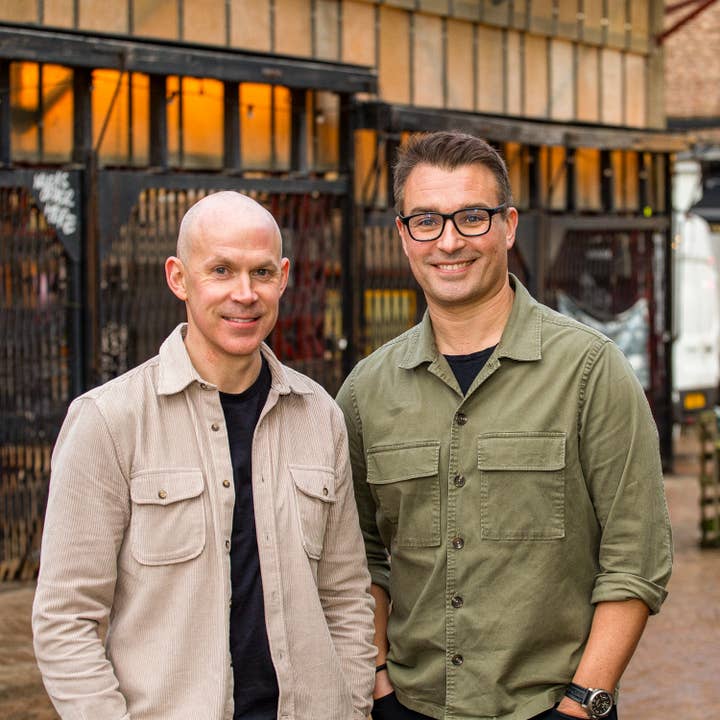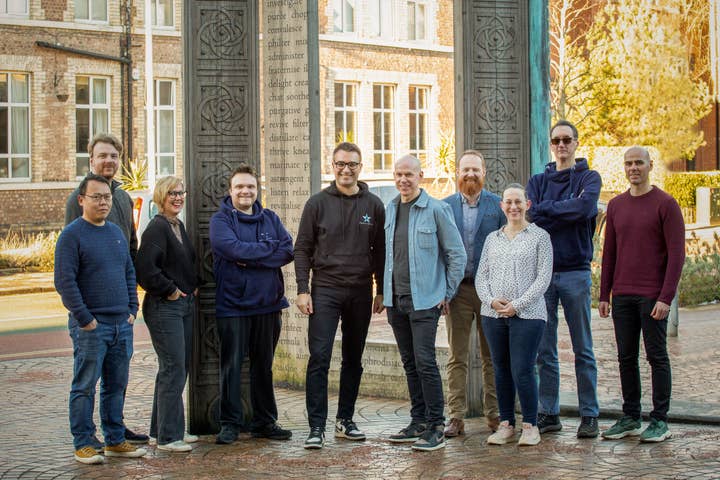Playdemic founders' new studio ForthStar Games will "test and kill" to find its next Golf Clash
Co-founder and CEO Paul Gouge talks about the ethos behind his fourth studio and plans to build a lasting legacy
Sign up for the GI Daily here to get the biggest news straight to your inbox
Paul Gouge and Alex Rigby have quite the track record.
The pair set up their first mobile games studio, BattleMail, in 2001 and sold it to (M)Forma a year later. Shortly after, they formed Rockpool Games, made the J2ME edition of Worms, and sold the developer to Eidos/Square Enix in 2007. Their third studio, Golf Clash creator Playdemic, opened doors in 2010 and two years ago sold to Electronic Arts for a whopping $1.4 billion – one of the biggest UK games acquisitions to date.
With three successful studios and five sales under their belt (Playdemic was owned by Warner Bros' TT Games and RockYou prior to EA), Gouge and Rigby today unveil their next venture: it's another games studio.
ForthStar Games is based in Manchester and already employs a team of 14, all of which are Playdemic alumni. Gouge and Rigby have secured $10 million from investor Griffin Games Partners and plan to unveil their first game next year.
The developer has actually been working in stealth since 2023, meaning it was just one year between the co-founders' departure from Playdemic and the creation of their new studio. Having already been through this process three times, why did they start a games studio from scratch again?
"The simple response is I don't know how to do anything else," Gouge tells GamesIndustry.biz. "In all seriousness, Alex and I took a bit of time off. I had a promise with my wife that I'd take a year off, and I think I did – she might disagree, but I'm pretty sure I had a year off.
"People are playing [mobile games] more than ever before... It is difficult to become one of those success stories, but they're still happening"
"During that time, I had a bit of self-reflection, did some investing and non-executive roles, and what came home to me is that this is what I love to do, and I know Alex does as well. We're really passionate about making games, it's what we've done for all our careers. We love the industry, we love the people, and we felt that we were still young enough to have another go… That's the long and short of it, we couldn't think of anything else better to do with our lives than to make video games."
The upside of having built and sold three studios is that Gouge and Rigby have plenty of experience, both good and bad, to draw on when shaping ForthStar. Gouge says the duo will be carrying over a lot of the practices from Playdemic – their most successful endeavour to date – and the first priority is recruiting a strong team.
"It's all about people. You hear that a lot, it sounds a bit trite, but I think a lot of companies will say that but not all of them actually live that. The one thing that I've learned more than anything is that you can have the best strategy in the world, you can have the best approach, the culture, but unless you can hire really talented, motivated individuals, all of that is for nought."
One practice Gouge says started at Playdemic and will become a fundamental pillar of ForthStar is how the team approaches conception for new games and ideas. While they dabbled in this at the Golf Clash studio, Gouge says his crew has "a real commitment to 'test and kill'."
Acknowledging that this is a philosophy often associated with Supercell, the new studio's co-founder and CEO says that being prepared to scrap any ideas that aren't delivering the best results – regardless of how much time and resources has been poured into them – is ultimately the best way forward for any developer.
"[ForthStar has] a real commitment to 'test and kill'"
"We're in an incredibly competitive marketplace and there's really little point bringing something to market unless you have a very high degree of confidence that that product is going to have high retention, high engagement and longevity," he explains. "That's something that we are religiously committed to in this business in a way we may not have been as committed to before – this idea of really killing anything that we don't believe wholeheartedly at any point in the development cycle is going to deliver the kind of success that we're looking for.
"If we don't believe either from our own internal testing or from external focus tests that they hold enough engagement, or they're compelling enough to be played many thousands of times for many years, then they are consigned to the bin forever."
Given the success of Golf Clash, which has passed more than 150 million installs, it's no surprise that ForthStar is eyeing mobile as its target platform – although Gouge is quick to point out that the studio won't be constraining itself solely to smart devices. For now, the priority is mobile.
ForthStar is also targeting "a similar audience to Golf Clash," but Gouge says its first title is unlikely to be a sports game. In fact, several prototypes for sports games have already been scrapped.
"For us it's probably going to be something that is new. There's a very famous product designer called Lowie, and he has this expression that I love: 'If you're gonna make something familiar, make it surprising. If you're gonna make something surprising, make it familiar.'
"So I think we're gonna bring something new to market, but I think it will feel familiar. It will be new and surprising in some senses, but it'll have a lot of familiarity to it and that will make it very accessible to that audience and rewarding."

That's easy to say, but the mobile market has arguably never been more competitive – to the point where Playtika temporarily ceased development on all new titles last year. Despite the hardships mobile developers face, Gouge remains convinced there are opportunities for the right game.
"If you zoom out, it's important for us to all remember that this is a huge market. We can all get tied up in the challenge of distribution and the competitive nature, but I'm not seeing people put their phones down and refuse to play mobile games. People are playing them as much if not more than ever before. And you look at the success stories and they're still there. It is difficult and it is hard to become one of those success stories, but they're still happening."
He points to the increasing growth of Royal Match as a prime example, a game that has become one of the biggest in the market, adding that he and Rigby are "not blind to the scale of that challenge." And he remains optimistic that ForthStar's 'test and kill' methodology increases its chances of finding a winning game concept.
"The best way to guarantee a return is actually to think about this more broadly and say, 'Look, we're going to invest an amount of capital in ultimately finding a hit. But along the way, we're going to very deliberately and actively kill products that aren't able to get there.'
"If you look at new products that come to market, many of them don't go through that process. Many companies aren't as rigorous at not pursuing ideas that haven't got very, very high degrees of performance already in the market, and that's something that we are very committed to."

Gouge even goes on to argue there's a mobile audience that is actually underserved: what he describes as "mass market competitive products." These, he says, are games that don't necessarily target the hardcore or even midcore demographics, but people who may not even consider themselves as gamers while still seeking out entertaining distractions on their phone that have a competitive framework.
"What I think Golf Clash does very well, and there's some other products in this market as well, is it gives you a short session, highly competitive, skill-based experience," Gouge explains. "It's very accessible – you don't have to see yourself as a gamer to access that product. It doesn't require knowledge of a particular genre, it doesn't require a particular set of controller-based dexterity. You can access that product very, very easily, but actually have a very rewarding and deep experience that goes on for many years.
"I don't think there are many companies that are trying to do that well, so we're looking at that audience. We think we can serve that audience well, we think we understand what they want."
With three sales to their name, it's not hard to imagine Gouge and Rigby finding a new home for ForthStar at some point in the future – although perhaps not quite to the tune of $1.4 billion this time around. But, for now, Gouge suggests he and the team are hoping to build something more sustainable and longer term.
"The long and short of it [is] we couldn't think of anything else better to do with our lives than to make video games"
He likens it to what Epic has achieved with Fortnite, using that game's success to help turn it into a platform and support other endeavours at the same time – although he stresses that they're not planning to build an environment based around user-generated content.
"I just mean as a point of principle, using a successful product and then building a company from that incredible resource that comes from that product," he explains. "What we dream of is building a product that can have the kind of commercial success that we saw with Golf Clash. What we then see is that would be an incredible foundation to building out a company with more longevity.
"I think what's incredible about these success stories is that if you look at, say, the top grossing games on mobile in 2023 – they generated over $8 billion in revenue, just those top ten products. So this is a market that can generate lots of cash and lots of profitability.
"And I think what excites me in this business is, once we achieve high levels of commercial success, is how we can use it – rather than maybe where we were before, thinking that's a highly valuable thing, we can sort of sell it to somebody else and personally become wealthy on the back of it. I think what I'm more interested in now is how you use that energy and that capital to really build something that has a long lasting legacy. For me personally, it's a really exciting way to think about the future of this company."









